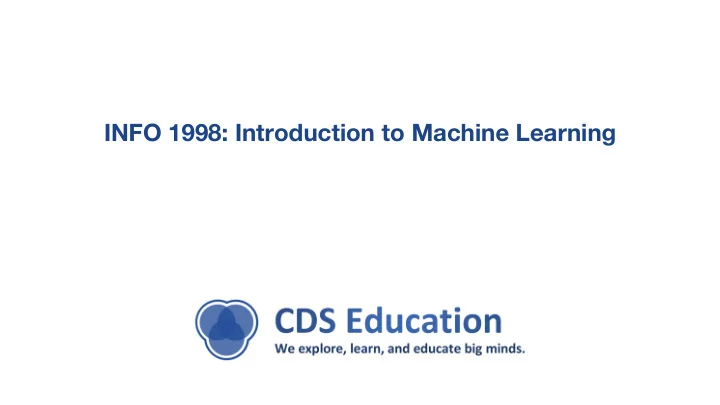

INFO 1998: Introduction to Machine Learning
Lecture 3: Data Visualization INFO 1998: Introduction to Machine Learning
Agenda 1. Why Data Visualization is Important 2. Data Visualization Libraries 3. Basic Visualizations 4. Advanced Visualizations 5. Challenges of Visualization
The Data Pipeline We are also here! Problem Statement Summary and visualization We are here! Statistical and Meaningful Raw data Usable data predictive output results Data cleaning, Data analysis, imputation, predictive normalization modeling, etc. Debugging, Solution improving models and analysis https://towardsdatascience.com/5-steps-of-a-data- science-project-lifecycle-26c50372b492
Why Data Visualization is Important? me Raw CSV file Data Visualization Source
Why Data Visualization is Important? Informative Appealing Universal Predictive
Why Data Visualization is Important? Same summary stats (mean, median, mode) but different distributions! We need to see how the actual data looks! df.describe() is not enough Source
Data Visualization Simple Example: Yelp Question: What do you notice? What trends do you see?
Data Visualization Libraries • matplotlib • Python data visualization package • Capable of handling most data visualization needs • Simple object-oriented library inspired from MATLAB • Cheatsheet • seaborn • Another visualization package built on matplotlib
Bar Graph • Represent magnitude or frequency of discrete variables • Allows us to compare features Source
Histograms • Used to observe frequency distribution of continuous variables • Data split into bins Source
Histograms: Different Bin Sizes Source
Density Plot Like a histogram, but smooths the shape of the distribution Source
Histogram vs Density Plot Source
Boxplot (a.k.a box and whisker plot) • Summary of data • Shows spread of data • Gives range, interquartile range, median, and outlier information Source
Violin Plot • Combination of boxplot and density plot to show the spread and shape of the data • Can show whether the data is normal
Demo 1
Scatterplot • See relationship between two features • Can be useful for extrapolating information
Heatmap • Varying degrees of one metric are represented using color • Especially useful in the context of maps to show geographical variation
Heatmap: Click Density / Website Heatmaps
Correlation Plots • 2D matrix with all variables on each axis • Entries represent the correlation coefficients between each pair of variables Why are all entries on the diagonal ‘1’? Source
Using Maps ➢ Map visualization → contextual information ○ Trends are not always apparent in the data itself ○ Ex) Longitudes + Latitudes → Geographical Map
Example: Pittsburgh Data
Demo 2
Challenges of Visualization Higher Dimension Non-Trivial Hard to Show Time Consuming Uncertainty
High Dimensional Data • Color, time animations, or point shape can be used for higher dimensions • There is a limit to the number of features that can be displayed 4D Plot For Earthquake Data
Error Bars Used to show uncertainty ● Usually display 95 percent confidence interval ●
Coming Up Assignment 2 : Due at 5:30pm on Mar 4, 2020 • Next Lecture : Fundamentals of Machine Learning • Data Scraping Workshop : March 2 (Mon), 4:30pm – 5:30pm, Rhodes 406 •
Recommend
More recommend